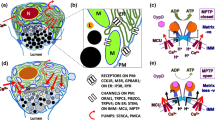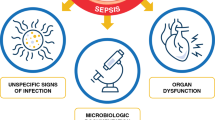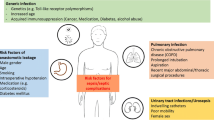Abstract
Background
Timely intervention can alter outcome in patients of infected pancreatic necrosis (IPN) but lacks adequate biomarker. Role of serum procalcitonin (PCT) in the management of IPN is understudied, and hence, this study was planned.
Methodology
All patients of acute pancreatitis with IPN without prior intervention were included. Baseline demographic, radiological and laboratory parameters were documented. PCT was measured at baseline, prior to intervention, and thereafter every 72 h. Patients were grouped into those having baseline PCT < 1.0 ng/mL and those with PCT ≥ 1.0 ng/mL and various outcome measures were compared.
Results
Of the 242 patients screened, 103 cases (66 males; 64.1%) with IPN were grouped into 2: PCT < 1.0 ng/mL (n = 29) and PCT ≥ 1.0 ng/mL (n = 74). Patients with baseline PCT ≥ 1.0 ng/mL had significantly more severe disease scores. 16 out of 19 patients with rise in PCT on day-7 post-intervention expired. PCT ≥ 1.0 ng/mL group had higher need for ICU (p = 0.001) and mortality (p = 0.044). PCT > 2.25 ng/mL (aOR 22.56; p = 0.013) at baseline and failure in reduction of PCT levels to < 60% of baseline at day-7 post-intervention (aOR 53.76; p = 0.001) were significant mortality predictors.
Conclusion
Baseline PCT > 1.0 ng/mL is associated with poor outcome. PCT > 2.25 ng/mL and failure in reduction of PCT levels to < 60% of its baseline at day-7 post-intervention can identify high-mortality risk patients.
Graphical Abstract





Similar content being viewed by others
References
Samanta J, Dhaka N, Gupta P et al. Comparative study of the outcome between alcohol and gallstone pancreatitis in a high-volume tertiary care center. JGH Open 2019;3:338–343.
Banks PA, Bollen TL, Dervenis C et al. Classification of acute pancreatitis–2012: revision of the Atlanta classification and definitions by international consensus. Gut 2013;62:102–111.
Boxhoorn L, Voermans RP, Bouwense SA et al. Acute pancreatitis. Lancet 2020;396:726–734.
Padhan RK, Jain S, Agarwal S et al. Primary and secondary organ failures cause mortality differentially in acute pancreatitis and should be distinguished. Pancreas 2018;47:302–307.
Garg PK, Singh VP. Organ failure due to systemic injury in acute pancreatitis. Gastroenterology 2019;156:2008–2023.
van den Berg FF, de Bruijn AC, van Santvoort HC et al. Early laboratory biomarkers for severity in acute pancreatitis A systematic review and meta-analysis. Pancreatology 2020;20:1302–1311.
Párniczky A, Lantos T, Tóth EM et al. Antibiotic therapy in acute pancreatitis: from global overuse to evidence based recommendations. Pancreatology 2019;19:488–499.
Simon L, Gauvin F, Amre DK et al. Serum procalcitonin and C-reactive protein levels as markers of bacterial infection: a systematic review and meta-analysis. Clin Infect Dis 2004;39:206–217.
Schuetz P, Chiappa V, Briel M, Greenwald JL. Procalcitonin algorithms for antibiotic therapy decisions: a systematic review of randomized controlled trials and recommendations for clinical algorithms. Arch Intern Med 2011;171:1322–1331.
Jain S, Mahapatra SJ, Gupta S et al. Infected pancreatic necrosis due to multidrug-resistant organisms and persistent organ failure predict mortality in acute pancreatitis. Clin Transl Gastroenterol 2018;9:190.
Larvin M, McMahon MJ. APACHE-II score for assessment and monitoring of acute pancreatitis. Lancet 1989;2:201–205.
Wu BU, Johannes RS, Sun X et al. The early prediction of mortality in acute pancreatitis: a large population-based study. Gut 2008;57:1698–1703.
Balthazar EJ, Robinson DL, Megibow AJ, Ranson JH. Acute pancreatitis: value of CT in establishing prognosis. Radiology 1990;174:331–336.
Kirkpatrick AW, Roberts DJ, De Waele J et al. Intra-abdominal hypertension and the abdominal compartment syndrome: updated consensus definitions and clinical practice guidelines from the World Society of the Abdominal Compartment Syndrome. Intensive care Med 2013;39:1190–1206.
Mallick B, Dhaka N, Gupta P et al. An audit of percutaneous drainage for acute necrotic collections and walled off necrosis in patients with acute pancreatitis. Pancreatology 2018;18:727–733.
Dellinger RP, Levy MM, Rhodes A et al. Surviving sepsis campaign: international guidelines for management of severe sepsis and septic shock: 2012. Critical Care Med 2013;41:580–637.
Hasibeder WR, Torgersen C, Rieger M, Dunser M. Critical care of the patient with acute pancreatitis. Anaesthesia Intensive Care 2009;37:190–206.
van Santvoort HC, Besselink MG, Bakker OJ et al. A step-up approach or open necrosectomy for necrotizing pancreatitis. N Engl J Med 2010;362:1491–1502.
Samanta J, Dhar J, Muktesh G et al. Endoscopic drainage versus percutaneous drainage for the management of infected walled-off necrosis: a comparative analysis. Expert Rev Gastroenterol Hepatol. 2022;16:297–305.
Singh AK, Samanta J, Shukla J et al. Impact of different patterns of organ failure on mortality in acute necrotizing pancreatitis. Pancreas. 2021;50:1030–1036.
Petrov MS, Shanbhag S, Chakraborty M et al. Organ failure and infection of pancreatic necrosis as determinants of mortality in patients with acute pancreatitis. Gastroenterology 2010;139:813–820.
Sharma M, Banerjee D, Garg PK. Characterization of newer subgroups of fulminant and subfulminant pancreatitis associated with a high early mortality. Am J Gastroenterol 2007;102:2688–2695.
Komolafe O, Pereira SP, Davidson BR, Gurusamy KS. Serum C-reactive protein, procalcitonin, and lactate dehydrogenase for the diagnosis of pancreatic necrosis. Cochrane Database Syst Rev 2017;4:CD012645.
Chen HZ, Ji L, Li L et al. Early prediction of infected pancreatic necrosis secondary to necrotizing pancreatitis. Medicine (Baltimore) 2017;96:e7487.
Mofidi R, Suttie SA, Patil PV et al. The value of procalcitonin at predicting the severity of acute pancreatitis and development of infected pancreatic necrosis: systematic review. Surgery 2009;146:72–81.
Rau BM, Kemppainen EA, Gumbs AA et al. Early assessment of pancreatic infections and overall prognosis in severe acute pancreatitis by procalcitonin (PCT): a prospective international multicenter study. Ann Surg 2007;245:745–754.
Müller CA, Uhl W, Printzen G et al. Role of procalcitonin and granulocyte colony stimulating factor in the early prediction of infected necrosis in severe acute pancreatitis. Gut 2000;46:233–238.
Staubli SM, Oertli D, Nebiker CA. Laboratory markers predicting severity of acute pancreatitis. Crit Rev Clin Lab Sci 2015;52:273–283.
Dandona P, Nix D, Wilson MF et al. Procalcitonin increase after endotoxin injection in normal subjects. J Clin Endocrinol Metab 1994;79:1605–1608.
Sager R, Kutz A, Mueller B, Schuetz P. Procalcitonin-guided diagnosis and antibiotic stewardship revisited. BMC Med 2017;15:15.
Schroeder S, Hochreiter M, Koehler T et al. Procalcitonin (PCT)-guided algorithm reduces length of antibiotic treatment in surgical intensive care patients with severe sepsis: results of a prospective randomized study. Langenbecks Arch Surg 2009;394:221–226.
Siriwardena AK, Jegatheeswaran S, Mason JM et al. PROCalcitonin-based algorithm for antibiotic use in Acute Pancreatitis (PROCAP): study protocol for a randomised controlled trial. Trials 2019;20:463.
Gurda-Duda A, Kusnierz-Cabala B, Nowak W et al. Assessment of the prognostic value of certain acute-phase proteins and procalcitonin in the prognosis of acute pancreatitis. Pancreas 2008;37:449–453.
Bezmarevic M, Mirkovic D, Soldatovic I et al. Correlation between procalcitonin and intra-abdominal pressure and their role in prediction of the severity of acute pancreatitis. Pancreatology 2012;12:337–343.
Singh AK, Samanta J, Dawra S et al. Reduction of intra-abdominal pressure after percutaneous catheter drainage of pancreatic fluid collection predicts survival. Pancreatology 2020;20:772–777.
Leroux P, De Ruffi S, Ramont L et al. Clinical outcome predictive value of procalcitonin in patients suspected with infection in the emergency department. Emerg Med Int 2021;2021:2344212.
Mallick B, Tomer S, Arora SK et al. Change in serum levels of inflammatory markers reflects response of percutaneous catheter drainage in symptomatic fluid collections in patients with acute pancreatitis. JGH Open 2019;3:295–301.
Samanta J, Rana A, Dhaka N et al. Ascites in acute pancreatitis: not a silent bystander. Pancreatology 2019;19:646–652.
Acknowledgments
Nil.
Funding
No funding.
Author information
Authors and Affiliations
Contributions
Guarantor of the article: JS. JS and JD: conception and design, data interpretation, data analysis, drafting the work, patient care and final approval. CLB, PG: data interpretation, patient care, intellectual review of the work and final approval. TDY, VG: data interpretation, intellectual review of the work, patient care and final approval. SKS, RK: data interpretation, critical review of the work and final approval. All authors have approved the final version of the article including the authorship list.
Corresponding author
Ethics declarations
Conflict of interest
All the authors declare no potential conflicts of interests.
Additional information
Publisher's Note
Springer Nature remains neutral with regard to jurisdictional claims in published maps and institutional affiliations.
Supplementary Information
Below is the link to the electronic supplementary material.
Supplementary file1 (DOCX 19 KB)
Online Resource table 1: Factors predicting mortality in patients with acute pancreatitis
Rights and permissions
Springer Nature or its licensor (e.g. a society or other partner) holds exclusive rights to this article under a publishing agreement with the author(s) or other rightsholder(s); author self-archiving of the accepted manuscript version of this article is solely governed by the terms of such publishing agreement and applicable law.
About this article
Cite this article
Samanta, J., Dhar, J., Birda, C.L. et al. Dynamics of Serum Procalcitonin Can Predict Outcome in Patients of Infected Pancreatic Necrosis: A Prospective Analysis. Dig Dis Sci 68, 2080–2089 (2023). https://doi.org/10.1007/s10620-022-07758-4
Received:
Accepted:
Published:
Issue Date:
DOI: https://doi.org/10.1007/s10620-022-07758-4




